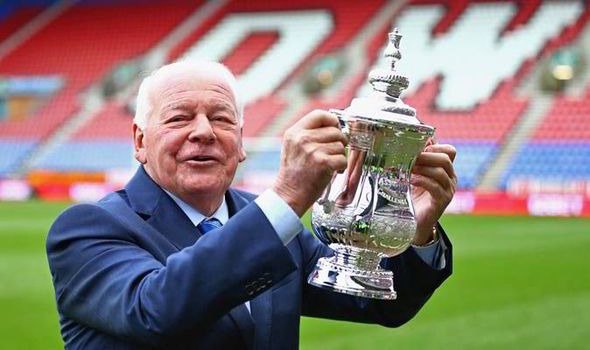FEATURE: A TIMELINE DETAILING THE SAD PLIGHT OF WIGAN ATHLETIC

Photo Credit: Getty Images
It was just ten years ago that Wigan Athletic defied all the odds to pip the free-spending Manchester City to the FA Cup – their first and only major honour to date.
In one of the greatest upsets in the competition’s 152-year history, midfielder Ben Watson managed to flick a header home in added time to seal a historic win for the Latics. Whatever your opinion on Wigan as a club, one could not help feeling a tad emotional as the TV screens panned to their 76-year-old chairman and owner Dave Whelan punching the air up in the stands as the players celebrated.
Just three days later, their jubilation was dampened somewhat when a 4-1 defeat away at Arsenal officially meant the end of their eight-year stay in the Premier League. No-one could have predicted just how much the Latics would fall as a club in the subsequent decade.
2015 – Whelan steps down as chairman
In March 2015, Whelan resigned as chairman after being charged by the FA for making anti-Semitic comments while defending his decision to appoint Malky Mackay as manager. His 23-year-old grandson, David Sharpe replaced him while Whelan remained as owner of Wigan Athletic.
A tumultuous campaign saw the Lancashire club slip into the third tier, just two years after their FA Cup success.
2018 – IEC become Wigan’s new owners
After several years of yo-yoing, Wigan find themselves back in the Championship and in November 2018, Whelan, now 81, agreed to sell the club after 23 years at the helm where he oversaw the club’s rise from fourth tier minnows to the Premier League in just ten years.
The new owners were Hong Kong-based company International Entertainment Corporation (IEC).
2020 – Wigan enter administration
Just 17 months later, and after having reportedly invested more than £44m into the club, IEC decided to sell up, citing the uncertain position of the EFL during the COVID-19 pandemic as one of the main reasons behind the decision.
They stated they would be selling to a company named Next Leader Fund (NLF) and the takeover was officially announced by the club a week later on June 4. Minority shareholder in the company, Au Yeung was announced as a new director at Wigan but in less than three weeks, he had become the majority shareholder of both NLF and the football club.
He then made the decision to approach management consulting company Begbies Traynor to become administrators, citing that £6m was needed for future funding and meaning that within just four weeks of being taken over, Wigan Athletic had fallen into administration.
A 12-point deduction meant relegation back to League One that season was all but inevitable.
2021 – Phoenix 2021 become Wigan’s new owners
In March 2021, after eight fruitless months of trying to find new ownership, the consortium Phoenix 2021 Ltd., led by Bahrain businessmen Abdulrahman Al-Jasmi and Talal Mubarak al-Hammad, successfully completed the takeover of Wigan Athletic.
The club narrowly avoided relegation to League Two that season but bounced back the following campaign, winning the league and earning promotion back to the Championship.
2023 – Financial woes continue
Two years later, it was clear Wigan were not out of the woods yet as they were docked three points for failing to pay their players. Tension between the playing staff and the club hierarchy was so fierce that the players refused to train on March 24 in protest.
The next month, the Latics’ relegation was confirmed and several players were again not paid for that month, for the fifth time that season. The EFL retrospectively deducted another three points off Wigan’s 2022-23 total and confirmed they would begin the following season in League One with minus eight points.
On June 4, after mounting pressure, the owners finally agreed to sell the club but the prospective buyer, a 21-year-old Sarbjot Johal had previously failed to provide sufficient funding to buy Morecambe FC.
Eight days later, having been placed under a transfer embargo by the EFL earlier that week, the HMRC lodged a winding-up petition against Wigan, with a hearing set to take place on July 26.
And that is the situation at the DW Stadium at this moment in time. In just ten years, Wigan Athletic have gone from a club lovingly guided through the ranks of the English Football League to the heady days of plying their trade in the Premier League and even FA Cup glory to a club shrouded in financial misconduct, mismanagement and neglect from foreign investors.
They are another example that brings about questions regarding the FA’s fit and proper test when it comes to potential buyers of football clubs and unless a new owner can turn things around quickly, they could be following the likes of fellow North West clubs in Bury and Macclesfield Town through the trapdoor.
Post a comment